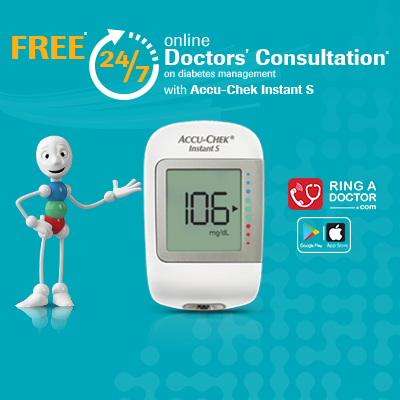Get free* 24/7 Online Doctors Consultation on Diabetes Management
This campaign has ended, please stay tuned for more info on our page. DISCLAIMER: Roche Pakistan Limited disclaims liability for any loss, damage and any other consequence resulting directly or indirectly from or relating to your access to the Ring a Doctor Website or any information that you may be provided or any transaction conducted on or...
Read MoreCarb Counting Exchanges
The truth about carbohydrates and diabetes The myth: If you have diabetes, you can't eat sweets or sugar. The truth: A food doesn't have to be sweet or sugary to raise your blood sugar. Anything with carbohydrates will affect your blood glucose, whether it's from white potatoes, pasta, bread or (insert local sweets here…jelly babies / lollies / strawberry laces).1 Of course, different foods may affect you differently. Why? Eating protein, fat or fiber along with your carbohydrates may slow the absorption of the carbohydrates into your system. That's why...
Read MoreThe Future of Diabetes Treatment
High-tech to zero-tech: The future of diabetes treatment Diabetes care has come a long way in just a few decades—after all, the first insulin pump was introduced in 1963, and fingerprick tests for personal blood glucose monitoring have only been around since the mid-1980s. So what's next? In development: Automating insulin delivery—the artificial pancreas Taking insulin pumping to the next level, an artificial pancreas is being tested that combines a continuous glucose monitor, insulin pump and glucagon pump (should blood glucose go too low), all managed by a smartphone. The goal is to...
Read MoreHow and Why to Get a Good Night’s Sleep
Why sleep is important for people with diabetes When you are getting enough sleep, you may find that you have an easier time controlling your blood sugar. You’ll be more alert during the day, have more energy, less stress, and an overall better mindset for monitoring and managing your diabetes. Consider what happens when you don’t get enough sleep. In addition to other things that may interfere with your sleep like schedule changes or stress, people with diabetes can have potential complications with sleep. Both high and low blood sugar levels can interrupt your sleep. People with type 2 diabetes...
Read MoreHow to Talk to Your Doctor
Whether you’ve been living with diabetes for years or you’re newly diagnosed, communicating with your healthcare team is one of the best things you can do. If you’re nervous about opening up to your doctor or pharmacist, there are some good reasons to conquer these fears. Less communication leads to measurable increases in your stress, anxiety, and possible depression. It also leads, inevitably, to less frequent and less successful diabetes management.1 Since communicating with your healthcare providers is proven to be good for your health, here are some guidelines for starting the conversation and keeping it...
Read MoreHow to Travel with Diabetes
Having diabetes adds complexity to planning a well-deserved holiday. Changing your schedule, time zones, increased activity, eating on-the-go or new foods can affect your health. You’ll want to be ready for anything. But don’t stress! We’re here to make it easy, with a review of everything you’ll need for hitting the roads, skies, seas, or rails. Make a doctor’s appointment If your trip is going to last longer than a day or two, make an appointment with your doctor or pharmacist a few weeks before you leave. Let them know your travel plans, and ask if they have any concerns or...
Read MoreLiving in Range
Feeling your best—life in your target range When you find your mind wandering—thinking about the future—what do you see? Whether you dream about taking photos somewhere amazing or starting a family, or you'd simply like to have more energy or sleep through the night, keeping your blood glucose in line can help you achieve it.Sometimes it can seem like diabetes is all about the numbers. But your efforts to stay within your target ranges for blood glucose before and after meals, as well as meeting your HbA1c goal, are really about feeling your best today and for years to come. Self-checks vs. HbA1c and...
Read MoreManaging Sick Days
Feeling fine? It's the perfect day to create a sick day plan. When you're feeling ill, you'd like nothing more than to lie in bed with a good book or movie. Yet that's when you need to focus even more on diabetes self-care. The key to sick days with diabetes is doing all of the thinking ahead of time. That way, when you don't feel like concentrating, you can simply follow the plan. What to include in your plan Involve your diabetes care healthcare team in developing your sick day plan—ask them when you should call for help, how often you should check...
Read MoreDiabetes Basics
Understanding the basics of diabetes is the first step in gaining control of your health. Let’s look at what causes diabetes, some of the common symptoms, the benefits of healthy living, and what to do if you’ve just been diagnosed. What is diabetes? Diabetes is a chronic disease. Your blood sugar levels are controlled by insulin, a hormone produced by your pancreas. When you eat, food gets broken down and glucose enters your bloodstream. Insulin takes the glucose out of your bloodstream and allows it to enter your cells where it is broken down and turned into energy. If you have diabetes, either you...
Read MorePages
Carb Counting Exchanges
The truth about carbohydrates and diabetes The myth: If you have diabetes, you can't eat sweets or sugar. The truth: A food doesn't have to be sweet or sugary to raise your blood sugar. Anything with carbohydrates will affect your blood glucose, whether it's from white potatoes, pasta, bread or (insert local sweets here…jelly babies / lollies / strawberry laces).1 Of course, different foods may affect you differently. Why? Eating protein, fat or fiber along with your carbohydrates may slow the absorption of the carbohydrates into your system. That's why...
Read MoreThe Future of Diabetes Treatment
High-tech to zero-tech: The future of diabetes treatment Diabetes care has come a long way in just a few decades—after all, the first insulin pump was introduced in 1963, and fingerprick tests for personal blood glucose monitoring have only been around since the mid-1980s. So what's next? In development: Automating insulin delivery—the artificial pancreas Taking insulin pumping to the next level, an artificial pancreas is being tested that combines a continuous glucose monitor, insulin pump and glucagon pump (should blood glucose go too low), all managed by a smartphone. The goal is to...
Read MoreHow and Why to Get a Good Night’s Sleep
Why sleep is important for people with diabetes When you are getting enough sleep, you may find that you have an easier time controlling your blood sugar. You’ll be more alert during the day, have more energy, less stress, and an overall better mindset for monitoring and managing your diabetes. Consider what happens when you don’t get enough sleep. In addition to other things that may interfere with your sleep like schedule changes or stress, people with diabetes can have potential complications with sleep. Both high and low blood sugar levels can interrupt your sleep. People with type 2 diabetes...
Read MoreHow to Talk to Your Doctor
Whether you’ve been living with diabetes for years or you’re newly diagnosed, communicating with your healthcare team is one of the best things you can do. If you’re nervous about opening up to your doctor or pharmacist, there are some good reasons to conquer these fears. Less communication leads to measurable increases in your stress, anxiety, and possible depression. It also leads, inevitably, to less frequent and less successful diabetes management.1 Since communicating with your healthcare providers is proven to be good for your health, here are some guidelines for starting the conversation and keeping it...
Read MoreHow to Travel with Diabetes
Having diabetes adds complexity to planning a well-deserved holiday. Changing your schedule, time zones, increased activity, eating on-the-go or new foods can affect your health. You’ll want to be ready for anything. But don’t stress! We’re here to make it easy, with a review of everything you’ll need for hitting the roads, skies, seas, or rails. Make a doctor’s appointment If your trip is going to last longer than a day or two, make an appointment with your doctor or pharmacist a few weeks before you leave. Let them know your travel plans, and ask if they have any concerns or...
Read MoreLiving in Range
Feeling your best—life in your target range When you find your mind wandering—thinking about the future—what do you see? Whether you dream about taking photos somewhere amazing or starting a family, or you'd simply like to have more energy or sleep through the night, keeping your blood glucose in line can help you achieve it.Sometimes it can seem like diabetes is all about the numbers. But your efforts to stay within your target ranges for blood glucose before and after meals, as well as meeting your HbA1c goal, are really about feeling your best today and for years to come. Self-checks vs. HbA1c and...
Read MoreManaging Sick Days
Feeling fine? It's the perfect day to create a sick day plan. When you're feeling ill, you'd like nothing more than to lie in bed with a good book or movie. Yet that's when you need to focus even more on diabetes self-care. The key to sick days with diabetes is doing all of the thinking ahead of time. That way, when you don't feel like concentrating, you can simply follow the plan. What to include in your plan Involve your diabetes care healthcare team in developing your sick day plan—ask them when you should call for help, how often you should check...
Read MoreDiabetes Basics
Understanding the basics of diabetes is the first step in gaining control of your health. Let’s look at what causes diabetes, some of the common symptoms, the benefits of healthy living, and what to do if you’ve just been diagnosed. What is diabetes? Diabetes is a chronic disease. Your blood sugar levels are controlled by insulin, a hormone produced by your pancreas. When you eat, food gets broken down and glucose enters your bloodstream. Insulin takes the glucose out of your bloodstream and allows it to enter your cells where it is broken down and turned into energy. If you have diabetes, either you...
Read More








